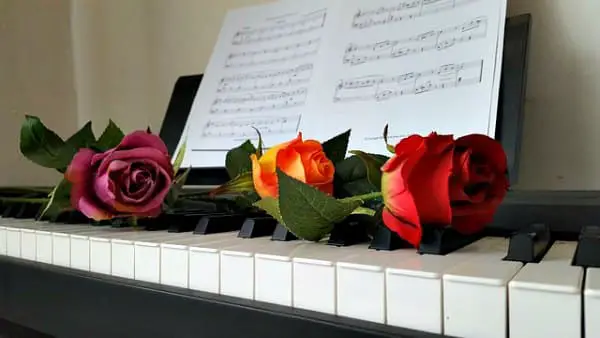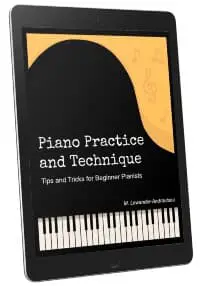- Home
- Piano Technique
- Improving Piano Technique
Improving Piano Technique with Body Awareness: Tips and Tools
This article may contain compensated links. Please read the disclosure for more info.
Improving piano technique is something we can all work on, no matter our skill level. It's all about being aware of how our body moves and finding the right balance to avoid unnecessary tension while we play.
By focusing on proper hand positioning, posture, and finger placement, we can start building a strong foundation for our playing technique. Learn some fundamental strategies that also work for beginners here.
Improving Piano Technique Without Pain
As you develop your piano technique, it is a good idea to learn how our skeletal system works- with tendons, ligaments, and all and not try to do things our body wasn't made to do.
- To avoid any neck or back pain for example, it's vital to learn how to sit correctly when practicing the piano. Equally important is to develop a good hand posture as soon as possible.
- Learning basic hand and arm movements is the next step, as you work with easy finger exercises to understand how to do different things with different fingers.
- Building «strength» is not so much about strength when it comes to piano playing; but about awareness and balance. Using brute force is getting you nowhere fast, both musically and physically.
 A Natural Piano Posture
A Natural Piano PostureDrawing inspiration from the classic film "Karate Kid," we can see how the young protagonist, despite not being big or strong, could excel in karate by learning how to balance and focus his body and mind and by conserving energy only where needed.
Similarly, as pianists, we need not rely solely on physical strength but rather on a harmonious combination of balance, focus, and mental preparation to improve our playing technique. Of course, honing our musical skills and practicing finger drills are crucial components as well.
One highly effective method that can help pianists to cultivate balance, focus, and proper body alignment is the Alexander Technique. This technique is specifically designed to "scale away" any unnecessary movements or tensions that can cause pain or discomfort, especially for musicians who spend long hours practicing and performing.
By learning the Alexander Technique, pianists can achieve a more fluid and effortless playing style, allowing for a deeper and more enjoyable musical experience.
The Old Way...
 Wanda Landowska (1879-1959)
Wanda Landowska (1879-1959)As with any other art form, the technical demands placed on pianists have evolved and changed over time. These changes are partly due to the instrument itself undergoing numerous transformations and innovations.
From the days of the lighter Hammer Clavier to the heavier hammer and key action found in modern-day Grand Pianos, mastering the piano requires a different technique for each instrument.
However, not too long ago, piano teachers insisted on "curve-your-fingers-or-else..." an outdated technique that relied on exaggeratedly curved fingers, resulting in tension and pain. This technique was derived from earlier instruments and styles of playing, and it no longer serves a practical purpose.
Additionally, some teachers would instruct their students to push their elbows outwards, insisting that they must remain in that position with excruciating neck and back pain as a result. (To look nice?)
Perhaps the old adage "No pain, no gain" played a role in this outdated approach to teaching piano technique... Regardless, it is essential for pianists today to adopt a more modern and effective approach to piano technique that prioritizes balance, fluidity, and ease of playing.
Weight Balance
The technical advice of earlier times reflects its own time. It might not always be helpful for the instruments we play today.
Because of the ever-increasing demand to improve piano technique, skills, and musical excellence (due to the enormous worldwide competition pianists face today), some advice from earlier than the 20th century might even be causing injury.
That aside, we can learn a lot from earlier technical advice (before the 1800s) on how to play keyboard instruments. For example, it can be used at advanced interpretation levels to better understand how earlier music styles were expected to be played.
With the development of the modern instrument (we still play today), with a heavier key action but also a greater sensitivity to the color of sound, the demand for a new technique caused pianists and pedagogues such as Tobias Matthay in the early 1900s, to write about piano touch and balance, or "weight effect." This was an important contribution to the development of modern piano technique. Get a well-used copy here for free.
The New Way: "Listening" to our Body
Today we know you can accomplish more, better, and longer by gradually building strength and flexibility in physical activities, including playing the piano. Gone are the days of pushing ourselves until we feel pain or discomfort, which can lead to serious injuries and setbacks.
Sure, our body is amazing. There seems to be almost no limit to our abilities! But it also has an inbuilt "alarm system." If something hurts, it is a sign that we must change or approach things differently. Therefore, we must learn to listen to our bodies and pace ourselves, especially when it comes to demanding physical activities such as playing the piano.
The increasing prevalence of repetitive strain injuries (RSIs) among musicians has led to extensive research on improving piano technique without causing injury. From proper posture and hand placement to exercises that target specific muscles and joints, there are numerous strategies that pianists can adopt to ensure that they can play at their best without putting themselves at risk.
Tools to help Fingers & Hands
Here are some tools to help strengthening and relaxing your fingers and hands. Use only if you feel that you need them, and use them gently:
- Finger Strengthener with Adjustable Resistance
- Physical Therapy Hand Exerciser
- Microwavable Therapy Mittens–Restore Function and Movement to Your Hands
Dry Fingertips:
Another issue that may cause tension and strain, is too dry fingertips. As I have recently moved to another country with a colder and drier climate, this has become an issue for me. Slipping around on the piano keys and not getting a real grip, can cause a lot of strain and tension (as well as frustration)!
The remedies for this, I have found, are to drink more water, and to use a lot of hand cream. But not all hand creams work, some make your fingers more slippery... So you have to try what works for you. Depending on your preference, these are highly recommended:
- Hydrating Hand Gel Cream Does not leave a greasy coat.
- O'Keeffe's Working Hands Hand Cream Relieves and repairs extremely dry hands.
And while you're at it, give your hands a good massage for increased circulation! :)
Improving Piano Technique with Mental Awareness
Developing one's piano technique involves much more than just building physical strength and dexterity. Mental awareness and preparation are critical elements that can help pianists perform with more confidence, ease, and expressiveness.
By paying attention to their thoughts, emotions, and physical sensations while practicing and performing, pianists can develop greater awareness of their bodies and minds. This heightened awareness can help them identify and release tension, correct posture and technique, and improve their overall playing.
A holistic approach to piano technique also involves understanding the psychological and emotional aspects of playing. Anxiety, stage fright, and self-doubt are common challenges that many pianists face, and developing mental strategies to cope with these challenges can make a significant difference in performance quality.
Practicing techniques such as mindfulness, visualization, and positive self-talk can help pianists stay calm and focused during performances. They can also cultivate a deeper connection to the music they are playing, allowing them to convey its emotional content more effectively to their audience.
In conclusion, a holistic approach to piano technique that includes mental awareness and preparation can help pianists improve their playing while reducing stress and anxiety. By integrating these techniques into their practice routines, pianists can achieve a more fulfilling and rewarding musical experience.
Here is a video where Barry Green gives an introduction to and explains more about "The Inner Game of Music":
Improving Piano Technique for Beginners
So, what does all this mean for a beginner pianist?
Since everything you learn from the start forms the foundation of later technical development- it's super important to get it right! But it's not complicated. Improving piano technique for beginners means getting the basics right:
-But above all, learn to listen to your body! Piano playing should never hurt. Ever.





